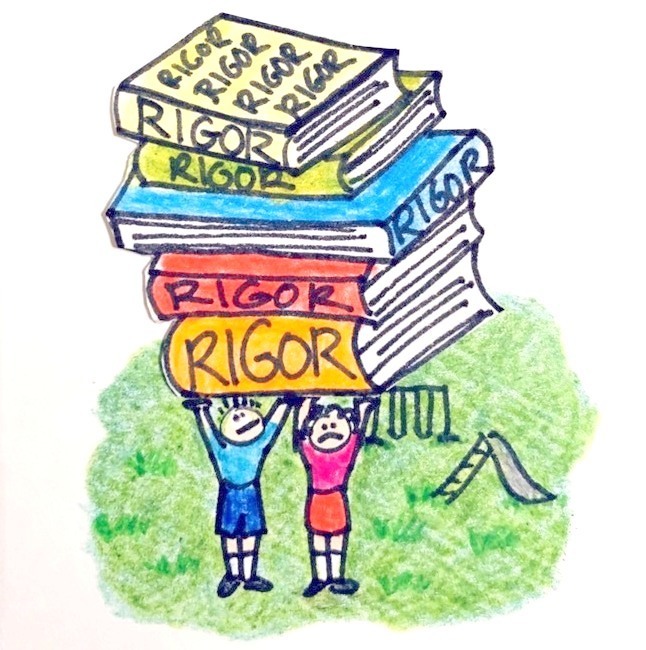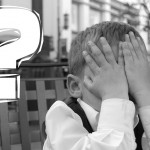Rigor: A popular buzz word in education today, this word is packed with meaning. It pops up in staff meetings, school mission statements, and parent conversations about school choice. Everyone seems to think that “rigor” is what kids need. But what does this word even mean?
Let’s start with the Merriam-Webster dictionary definition:
Rigor
- (a) Harsh inflexibility in temper, opinion, or judgment; (b) the quality of being unyielding and inflexible; (c) severity of life
- A tremor caused by a chill
- A condition that makes life difficult, challenging, or uncomfortable
- Strict precision
Well, those definitions offer some opportunities for reflection! According to Merriam-Webster, rigor doesn’t sound like a good thing at all. And I think parents are starting to see that rigor can be a problem.
In my past ten years teaching preschool, I’ve had many conversations with parents that start like this: “Will my child be ready for kindergarten next year?” This is a normal question for caring parents who want their child to be successful. This year, I feel a startling shift. Parents are beginning to ask, “Should my (kindergarten age) child go to kindergarten next year?”
When did this become a reasonable question? Shouldn’t kindergarten be developmentally appropriate for kindergarten age children? Sadly, I think we all know there has been a shift. People often say that “kindergarten isn’t what it used to be.” (They don’t seem to mean this in a good way.) I reached out to a friend with many years kindergarten experience, and here is what she said:
I taught kinder for almost 30 years and saw the transition from developmentally appropriate to “boot camp for first grade.” The idea that you move slowly and thoroughly to develop the whole child [has changed] to skill and drill as we do now. It began with no child left behind. What I have seen are many children being left behind because we ignore their natural development and learning styles and push them on with so many holes and gaps and only an ability to regurgitate information.
Is this what “rigor” has brought us? Is being rigorous a sign of teaching accomplishment? A badge of courage? One of my friends enrolled her child with a teacher who bragged to be “the hardest kindergarten class in the whole district.” When did that become a bragging point? My friend later found out that many parents were opting to postpone their child’s kindergarten enrollment until age six because all the teachers at that school were notoriously difficult. Can I ask again: When did kindergarten become inappropriate for kindergarteners?
Perhaps the Merriam-Webster definition about rigor is accurate. We have created a system that can be unyielding, inflexible, and severe. As a result, school life can become difficult, challenging, and uncomfortable for students and their families. There can be anxious feelings like a tremor caused by a chill. Yeah, that seems to describe it. And don’t blame the educators here. These are the results of policies like No Child Left Behind, Move On When Reading, and high stakes tests that result in school letter grade labeling. Schools are obligated to implement policies legislated from above with their best effort. These policies aren’t always good for kids. Thanks rigor.
I’m concerned to hear people talking about retention in kindergarten or parent-elected delayed start. Retention creates long-lasting consequences for kids. Research shows that retention can decrease the likelihood of high school graduation and harm a child’s school attitude. And there will be new challenges for teachers as they differentiate for a wider age group. I believe kids should be with same-age peers, and I believe that school should be developmentally appropriate for kids enrolled in that grade level.
I think rigor has gone way too far. My second-grade neighbor does homework from the time she arrives home until dinner time. She has no time to play. How disturbing! Research shows play is essential for healthy child development. (Arizona’s recent Recess Law is a good start, but deeper discussions are needed.) In West Virginia, state law changed the age of kindergarten admission to ensure children were two months older. I don’t see this being a solution. Why are we trying to change the children? How about we look at our expectations and practices instead.
Perhaps we need to carefully examine and redefine what “rigor” means in our schools. Families should feel confident that their kindergarten-aged children will have a good experience in kindergarten. And kindergarten teachers should have standards and expectations that reflect the age of the children they serve. I hope that educators and parents can work together at the policy level to bring these changes to Arizona. I look forward to your thoughts on this matter in the comments section below!










Comments 9
You bring up some very valid points about the way rigor has changed. Before I would think of rigor as challenging students in a way that is developmentally appropriate, but what you are seeing at the pre-K and Kinder levels sounds like the opposite. Thank you for sharing!
Thanks for the comment Amy! I think the phrase “challenging students in a way that is developmentally appropriate” is exactly right. We can all work together to ensure that we are seeing that in our grade level teams and schools–and speak up if we see unnecessary rigor that does not benefit students.
Great post Jess! We definitely need to take a closer look at we mean when we say rigor; like you said, “Perhaps we need to carefully examine and redefine what “rigor” means in our schools” Your blog demonstrates that perhaps we have taken a wrong turn some where. It has surely become one of the those overused buzz words and everyone has their own definition of what they think it means:
Taken from Mentoring Minds…Myths
“Students must do more work. Oftentimes “more work,” including increased homework, really means low-level activities and repetition.”
“Students need to solve problems independently. Learning to figure out a problem is important, but that doesn’t mean the teacher shouldn’t offer support and help guide students in the right direction.”
“Rigor is just one more thing to do. Many educators view adding rigor to their instruction as an entirely separate undertaking.”
For me, rigor always meant supporting my students and giving them a little bit of a challenge to push their thinking, really honing in on those critical thinking skills. This is definitely one of those educational topics that we need to bring back to the table and have some serious conversations about, so we don’t end up hurting our little ones. You got me fired up Jess!! Excellent blog to drive more discussion on this!!
Thanks so much for the reflective, thoughtful comments. Hoping to read a follow up blog I think teachers can take a stand to define what rigor really means–and we can be leaders on our teams to make it clear what rigor is not. I think many teachers DO have the right idea about what rigor should be (as you clearly do). Most importantly, teachers need time to talk and plan together so that they can structure for student success and incorporate supports for their thinking to counter-balance the rigorous opportunities they offer.
I think teachers can take a stand to define what rigor really means–and we can be leaders on our teams to make it clear what rigor is not. I think many teachers DO have the right idea about what rigor should be (as you clearly do). Most importantly, teachers need time to talk and plan together so that they can structure for student success and incorporate supports for their thinking to counter-balance the rigorous opportunities they offer.
Thanks Jess. I really support your points on kindergarten and retention. I couldn’t agree more.
No kidding, on all points. Google adds that rigor is short for rigor mortise.
I completely agree – rigor has gone way too far! I once heard a quote that educators should make the material as easy as possible for students to learn. This doesn’t mean dumbing things down, but teaching the new concepts in the most student friendly way so our students can master the material and be successful. Rigor seems to be the exact opposite of this. Is this what education has come to – making the material as difficult as possible for students to learn so only a select few can be successful?
Agreed. I actually heard some high school teachers telling a story the other day about how they made the first few weeks exceptionally hard to get students to drop the class. Of course, the saddest part of the story was that they felt they HAD to do this because the class was going to be way too big–and they were trying to get the class to a more manageable size. Perhaps class size is one of the hardest thing about teaching various grade levels right now. One thing is for sure: there is plenty of rigor for the TEACHERS in this profession. Thanks so much for the comment!
This is a real thing that I have seen happen. Rigor can’t just mean more. I like to use the word vigor. Learning should be vigorous, not rigorous.